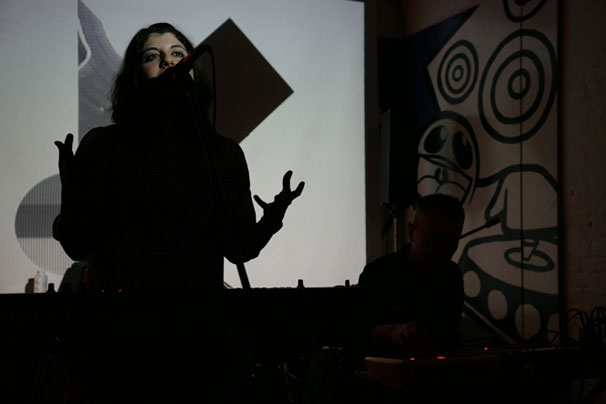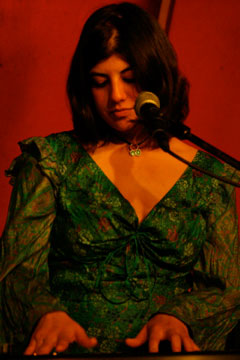We were still flowing on the enchanting voice, the absorbing experimental soundworlds and the wise lyrics (full of many hints and references to David Lynch films) by Roshi Nasehi. Welsh with Iranian background, her second album “3 Almonds and a Walnut“, which follows the critically acclaimed debut album “The Sky & The Caspian Sea” , was produced again by Roshi’s main collaborator , the British percussionist and composer Graham Dowdall (Gagarin, Pere Ubu, Nico, Cortex, Faction…). We decided to have a chat with this talented singer. We warmly recommend you join the flow… Roshi ft.Pars Radio’s “3 Almonds and a Walnut” is being released by Gagarin’s GEO Records.
Chain D.L.K.: Hi Roshi. How are you?
Roshi Nasehi: Yes, I am good.
Chain D.L.K.: Before speaking about your astonishing second album, could you introduce yourself in your own words?
Roshi Nasehi: Thank you… I’m Roshi, a Welsh-born singer-writer of Iranian descent living in London. My main music project Roshi featuring Pars Radio is a collaboration with wonderful sound artist Graham Dowdall. We mix reinterpretations of the Iranian (mostly folk) songs I grew up hearing with original material.

Chain D.L.K.: How did you discover your passion for music and singing?
Roshi Nasehi: It’s been with me since I was a child. I remember singing daily at school. Wales has a big singing culture and songs at school encompassed Welsh folk songs, 80s pop, and songs from musicals. Early memories also include hearing my parent’s old tapes of Iranian pop and folk music and later on my dad resuming playing traditional Iranian music on the violin, which is something he had learned as a child in Iran. All these things have had a bearing on my music activities as an adult.
Chain D.L.K.: You’re half Iranian half Welsh… do you think this mixture has had an influence on your creativity?
Roshi Nasehi: Actually both my parents are Iranian but I was born in Wales and lived there for the first 21 years of my life so I grew up feeling Welsh and Iranian. I now also feel like a Londoner after many years of living here. I certainly inherited Iranian songs and sounds from my parents and my early musical experiences and later music college training in Wales has also had an impact too. I think at this stage my experience of London and collaborating with a Londoner have also influenced me with songs like “Nunhead Cemetry”.
Chain D.L.K.: How did you meet Graham Dowdall and when did the idea of a collaboration begin to sparkle?
Roshi Nasehie: I met him 11 years ago at a music workshop, training rather than performance. We both practice as workshop leaders and see it as a great and natural way to use our skills in addition to writing/recording and performing. Collaborating toward performance happened very organically a few years after we met, though Graham’s creativity was apparent to me straight away.
Chain D.L.K.: Let’s speak about “3 Almonds and a walnut”… or do you prefer we call it “oosh Badam ber Goz”? What’s the story behind such a title?
Roshi Nasehi: The song is a very playful track based on a rhythm which has an accompanying chant “oosh Badam ber Goz” meaning “3 Almonds & a Walnut” which is apparently what children chant in order to remember the rhythm (i.e. it’s a kind of mnemonic). In addition to the rhythm I talk and sing about having a nut allergy (ha – which has been a genuine dilemma as an Iranian) and there are some other ‘playground’ style chants. It’s the title track from our second full length record.
Chain D.L.K.: Is there any link to your previous album “The Sky & The Caspian Sea”?
Roshi Nasehi: I think it’s a development from our last record. There are more vocal and rhytmic experiments, and we play with different musical styles more. Certain musical interests remain the same for us, for instance in using my voice and Graham’s electronics to create a specific atmosphere or specific expressive purpose and we’ve continued our interest in ‘found sounds’ sometimes nostalgic sounds like old-fashioned radio style hissing which is soon to become a thing of the past with digital technology.
Chain D.L.K.: One of my favorite songs of the album is “Postcard”… how did you collect all the evoked images on that song? What’s the tower falling inch after inch?
Roshi Nasehi: It was my response to a trip to Pisa, Italy. It was the contradiction between the beautiful historic buildings that should provoke a feeling of transience and the sad reality of how touristy and saturated it felt.
Chain D.L.K.: Another song with interesting references is “Nunhead Cemetery”. You also collected field recordings from a cemetery for that song… did anyone come back from the dead after getting charmed by your voice?
Roshi Nasehi: Haha it is a lovely atmospheric place and we wanted to capture some of the natural sound track of the place.
Chain D.L.K.: “Don’t breathe it to a soul but Amarilly is getting gay with a dude” (what a title!) is one of the two songs you made under commission for a live score of silent movie “Amarilly of Clothes Line Alley”. Could you tell us more about this work?
Roshi Nasehi: I was commissioned by Birds Eye View to create a live score to a silent Mary Pickford feature from 1918, “Amarilly Of Clothes Line Alley” for the 2012 Southbank Women Of The World Festival. I knew a little about Mary Pickford already, but not this comedy feature. The “Don’t breathe it to a soul” music was created for a 7 and a half-minute sequence which starts off in a slightly spooky studio setting with industrial materials and skulls and later features people whispering and gossiping (the title is an intertitle from the film) all of which inspired our approach to making the music. The original can be viewed here http://www.youtube.com/watch?v=7V2FAR_nttw
Chain D.L.K.: What about “Pache Leili”?
Roshi Nasehi: This is a traditional Iranian song from Northern Iran and the words are in a Farsi dialect so I had to ask my mother what they meant as it was particularly difficult for me to immediately grasp (my Grandmother on my mother’s side is from Rasht which is the area where the song originates from). It is an unrequited love song with a hauntingly beautiful melody and Graham and I wanted to experiment with harmonising and jazzy rhythms in it.
Chain D.L.K.: Even though minimal electronic sonic frames by Graham are cool, I sometimes imagined orchestral arrangement while listening to many songs of yours… are you going to rearrange any of them or would you arrange any of them for a live performance?
Roshi Nasehi: We want to stay as true to the record as possible in live performances, so for instance I multi-track my voice live through looping and live vocal effects as well as playing keyboards and synths etc. Graham is triggering found sounds via a sampler as well as playing beats via drum pads and pedals. I love his performative approach to making digital music. I find it much more interesting than just going through a laptop.

Chain D.L.K.: You sing that song in an excellent way… what does it refer to?
Roshi Nasehi: I think I was mainly playing with the idea of ‘the love song’ in pop and dance music and I think that Graham and I were playing with those musical styles, though the lyrics are relevant to frustrations I’ve had (maybe frustrations we all have) when communication isn’t working with someone else… “the words don’t always flow, I say the wrong thing or you do'” etc and I was trying to create a general sense of word play with the repeated syllabic words “talk,talk,talk,talk” “lines,lines,lines,lines” etc, etc.
Chain D.L.K.: What do you think about Gagarin’s remix of “Don’t breathe it…”? Did Graham propose a number of different versions of that song before choosing one?
Roshi Nasehi: We released the original version on a limited edition 7″ with a remix from David Thomas (Pere Ubu). In addition to his wonderful ‘stark, freaked out’ remix, we had remixes from Kerry Andrew (aka You Are Wolf) and Justin Paton (NOW). I love how each artist has done their own thing with the track. Graham’s ‘Gagarin’ remix has his South London bass vibe combined with an homage to drum and bass.
Chain D.L.K.: Any forthcoming tours? Will you perform outside UK as well?
Roshi Nasehi: Actually our next performance is in Paris at the beautiful Eglise St. Merri (76 Rue de la Verrerie) near Centre Pompidou on Sunday August 25th at 4pm. We’d love to play more European shows. We’ve both performed in other European clubs (particularly Graham) with other projects, but we haven’t done it enough with this project! We are putting together a UK tour in Autumn.
Chain D.L.K.: I’ve read Aziz Joon is an Iranian folk love song…what’s its meaning? Do you think what we call love has many possible declensions with regard to the originating cultural contest?
Roshi Nasehi: Like other folk songs this one has a social commentary and is about a person leaving their village probably to go to war. They are saying goodbye to a mother figure and remembering their true love. I find the similar concerns people express in old folk songs, regardless of where they are from are endlessly fascinating. As for the different declensions of love, it is true that we only have one word in English which potentially means many different things…
visit Roshi feat.Pars Radio on the web at: roshi.biz

